英语史上有最多歧义的句子
- 格式:doc
- 大小:23.50 KB
- 文档页数:2
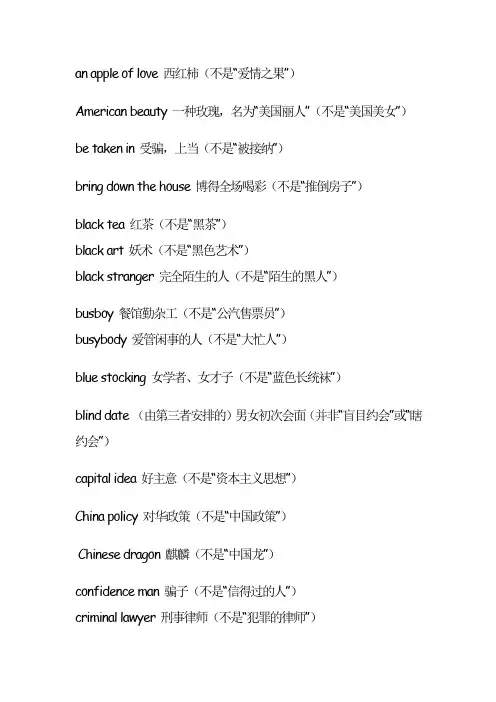
an apple of love 西红柿(不是“爱情之果”)American beauty 一种玫瑰,名为“美国丽人”(不是“美国美女”)be taken in 受骗,上当(不是“被接纳”)bring down the house 博得全场喝彩(不是“推倒房子”)black tea 红茶(不是“黑茶”)black art 妖术(不是“黑色艺术”)black stranger 完全陌生的人(不是“陌生的黑人”)busboy 餐馆勤杂工(不是“公汽售票员”)busybody 爱管闲事的人(不是“大忙人”)blue stocking 女学者、女才子(不是“蓝色长统袜”)blind date (由第三者安排的)男女初次会面(并非“盲目约会”或“瞎约会”)capital idea 好主意(不是“资本主义思想”)China policy 对华政策(不是“中国政策”)Chinese dragon 麒麟(不是“中国龙”)confidence man 骗子(不是“信得过的人”)criminal lawyer 刑事律师(不是“犯罪的律师”)dead president 美钞(上印有总统头像)(并非“死了的总统”)dry goods (美)纺织品;(英)谷物(不是“干货”)dressing room 化妆室(不是“试衣室”或“更衣室”)eat one's words 收回前言(不是“食言”)English disease 软骨病(不是“英国病”)eleventh hour 最后时刻(不是“十一点”)familiar talk 庸俗的交谈(不是“熟悉的谈话”)French chalk 滑石粉(不是“法国粉笔”)Greek gift 害人的礼品(不是“希腊礼物”)green hand 新手(不是“绿手”)handwriting on the wall 不祥之兆(不是“大字报”)have a fit 勃然大怒(不是“试穿”)have the heart to do (用于否定句)忍心做……不是“有心做”或“有意做”)heartman 换心人(不是“有心人”)horse sense 常识(不是“马的感觉”)Indian summer 愉快宁静的晚年(不是“印度的夏日”)in one's birthday suit 赤身裸体(不是“穿着生日礼服”)lover 情人(不是“爱人”)mad doctor 精神病科医生(不是“发疯的医生”)personal remark 人身攻击(不是“个人评论”)pull up one's socks 鼓起勇气(不是“提上袜子”)red tape 官僚习气(不是“红色带子”)rest room 厕所(不是“休息室”)sporting house 妓院(不是“体育室”)sweet water 淡水(不是“糖水”或“甜水”)service station 加油站(不是“服务站”)Spanish athlete 吹牛的人(不是“西班牙运动员”)think a great deal of oneself 高看或看重自己(不是“为自己想得很多”)white coal (作动力来源用的)水(不是“白煤”)white man 忠实可靠的人(不是“皮肤白的人”)yellow book 黄皮书(法国政府报告书,以黄纸为封)(不是“黄色书籍”)pull one's leg 开玩笑(不是“拉后腿”)make one's hair stand on end 令人毛骨悚然—恐惧(不是“令人发指,气愤”)What a shame! 多可惜!真遗憾!(不是“多可耻”)You don't say! 是吗!(不是“你别说”)You can say that again! 说得好!(不是“你可以再说一遍”)I haven't slept better. 我睡得好极了。
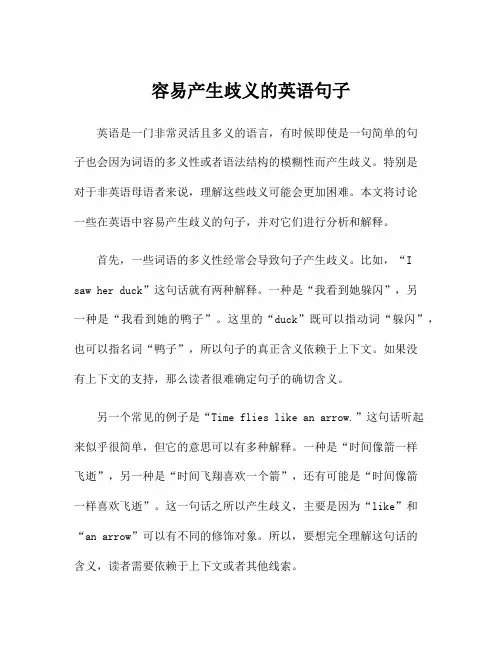
容易产生歧义的英语句子英语是一门非常灵活且多义的语言,有时候即使是一句简单的句子也会因为词语的多义性或者语法结构的模糊性而产生歧义。
特别是对于非英语母语者来说,理解这些歧义可能会更加困难。
本文将讨论一些在英语中容易产生歧义的句子,并对它们进行分析和解释。
首先,一些词语的多义性经常会导致句子产生歧义。
比如,“I saw her duck”这句话就有两种解释。
一种是“我看到她躲闪”,另一种是“我看到她的鸭子”。
这里的“duck”既可以指动词“躲闪”,也可以指名词“鸭子”,所以句子的真正含义依赖于上下文。
如果没有上下文的支持,那么读者很难确定句子的确切含义。
另一个常见的例子是“Time flies like an arrow.”这句话听起来似乎很简单,但它的意思可以有多种解释。
一种是“时间像箭一样飞逝”,另一种是“时间飞翔喜欢一个箭”,还有可能是“时间像箭一样喜欢飞逝”。
这一句话之所以产生歧义,主要是因为“like”和“an arrow”可以有不同的修饰对象。
所以,要想完全理解这句话的含义,读者需要依赖于上下文或者其他线索。
不仅是词语的多义性,有时候句子的语法结构也会让人产生误解。
比如,“The old man the boats.”这句话看上去是一个简单的陈述句,但它实际含义可能会有不同的解释。
一种可能的解释是“老人管理这些船”,另一种是“这些船老化了”。
这里的歧义主要来自动词“man”的不同解释。
如果“man”被理解为及物动词,那么这句话的意思是“老人管理船只”,如果“man”被理解为名词,那么这句话的意思是“船只老化了”。
对于非英语母语者来说,这种歧义可能会让他们感到困惑。
此外,有时候句子的语态也会让人产生误解。
比如,“The chicken is ready to eat.”这句话看上去似乎没有什么问题,但它的含义可能会有不同的解释。
一种可能是“鸡准备好了,可以吃了”,另一种是“鸡已经准备好了,可以吃了”。
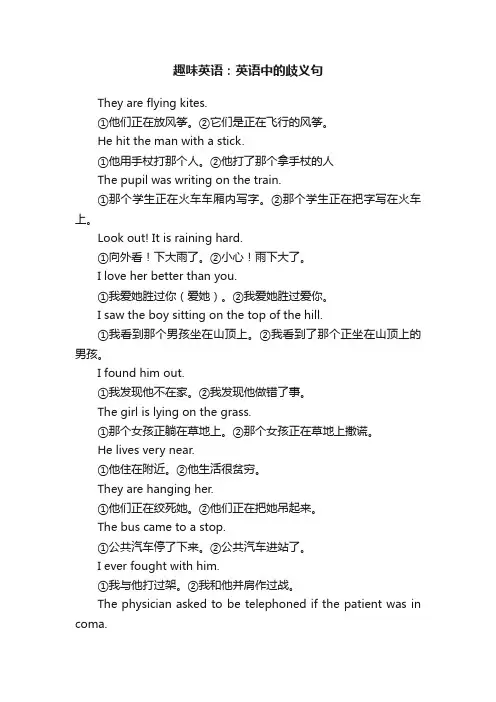
趣味英语:英语中的歧义句They are flying kites.①他们正在放风筝。
②它们是正在飞行的风筝。
He hit the man with a stick.①他用手杖打那个人。
②他打了那个拿手杖的人The pupil was writing on the train.①那个学生正在火车车厢内写字。
②那个学生正在把字写在火车上。
Look out! It is raining hard.①向外看!下大雨了。
②小心!雨下大了。
I love her better than you.①我爱她胜过你(爱她)。
②我爱她胜过爱你。
I saw the boy sitting on the top of the hill.①我看到那个男孩坐在山顶上。
②我看到了那个正坐在山顶上的男孩。
I found him out.①我发现他不在家。
②我发现他做错了事。
The girl is lying on the grass.①那个女孩正躺在草地上。
②那个女孩正在草地上撒谎。
He lives very near.①他住在附近。
②他生活很贫穷。
They are hanging her.①他们正在绞死她。
②他们正在把她吊起来。
The bus came to a stop.①公共汽车停了下来。
②公共汽车进站了。
I ever fought with him.①我与他打过架。
②我和他并肩作过战。
The physician asked to be telephoned if the patient was in coma.①医生要求若病人昏迷了就打电话给他。
②医生要求打电话告诉他病人是否昏迷。
He is playing with her.①他正在和她一起玩耍。
②他正在玩弄她。
People found putting up false advertisements in the streets will be punished according to the new law.①根据新法规,被发现在街上贴虚假广告的人将受到惩罚。
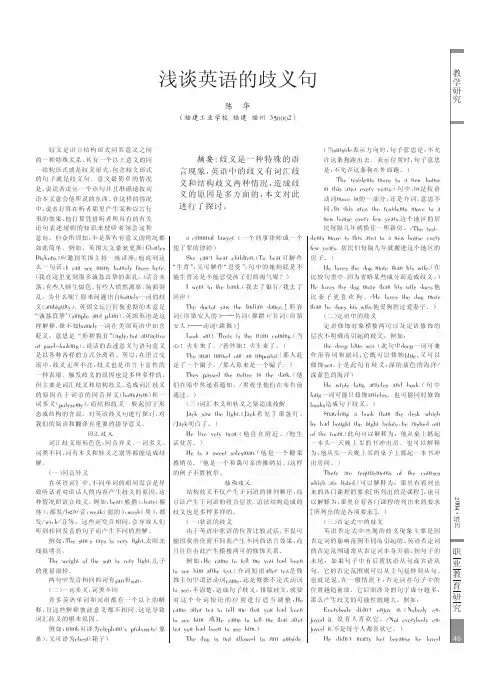
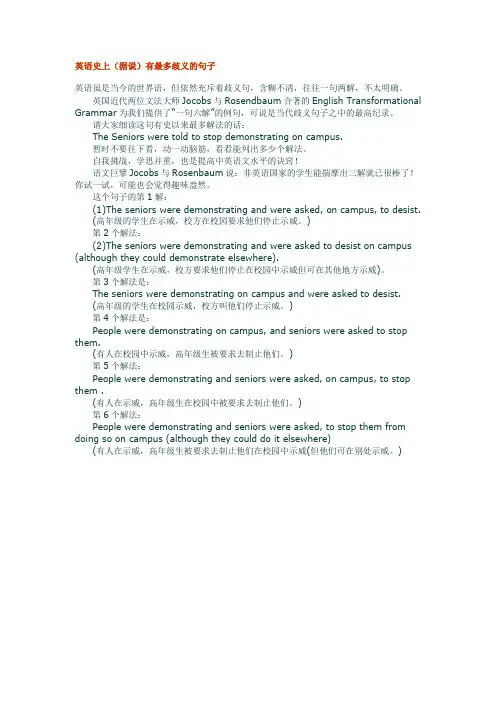
英语史上(据说)有最多歧义的句子英语虽是当今的世界语,但依然充斥着歧义句,含糊不清,往往一句两解,不太明确。
英国近代两位文法大师Jocobs与Rosendbaum合著的English Transformational Grammar为我们提供了“一句六解”的例句,可说是当代歧义句子之中的最高纪录。
请大家细读这句有史以来最多解法的话:The Seniors were told to stop demonstrating on campus.暂时不要往下看,动一动脑筋,看看能列出多少个解法。
自我挑战,学思并重,也是提高中英语文水平的诀窍!语文巨擘Jocobs与Rosenbaum说:非英语国家的学生能揣摩出三解就已很棒了!你试一试,可能也会觉得趣味盎然。
这个句子的第1解:(1)The seniors were demonstrating and were asked, on campus, to desist.(高年级的学生在示威,校方在校园要求他们停止示威。
)第2个解法:(2)The seniors were demonstrating and were asked to desist on campus (although they could demonstrate elsewhere).(高年级学生在示威,校方要求他们停止在校园中示威但可在其他地方示威)。
第3个解法是:The seniors were demonstrating on campus and were asked to desist.(高年级的学生在校园示威,校方叫他们停止示威。
)第4个解法是:People were demonstrating on campus, and seniors were asked to stop them.(有人在校园中示威,高年级生被要求去制止他们。
)第5个解法:People were demonstrating and seniors were asked, on campus, to stop them .(有人在示威,高年级生在校园中被要求去制止他们。
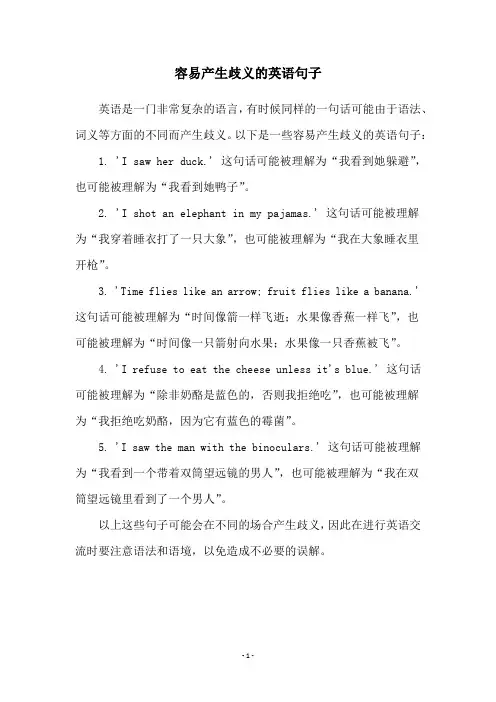
容易产生歧义的英语句子
英语是一门非常复杂的语言,有时候同样的一句话可能由于语法、词义等方面的不同而产生歧义。
以下是一些容易产生歧义的英语句子: 1. 'I saw her duck.' 这句话可能被理解为“我看到她躲避”,也可能被理解为“我看到她鸭子”。
2. 'I shot an elephant in my pajamas.' 这句话可能被理解
为“我穿着睡衣打了一只大象”,也可能被理解为“我在大象睡衣里
开枪”。
3. 'Time flies like an arrow; fruit flies like a banana.' 这句话可能被理解为“时间像箭一样飞逝;水果像香蕉一样飞”,也
可能被理解为“时间像一只箭射向水果;水果像一只香蕉被飞”。
4. 'I refuse to eat the cheese unless it's blue.' 这句话可能被理解为“除非奶酪是蓝色的,否则我拒绝吃”,也可能被理解
为“我拒绝吃奶酪,因为它有蓝色的霉菌”。
5. 'I saw the man with the binoculars.' 这句话可能被理解为“我看到一个带着双筒望远镜的男人”,也可能被理解为“我在双
筒望远镜里看到了一个男人”。
以上这些句子可能会在不同的场合产生歧义,因此在进行英语交流时要注意语法和语境,以免造成不必要的误解。
- 1 -。
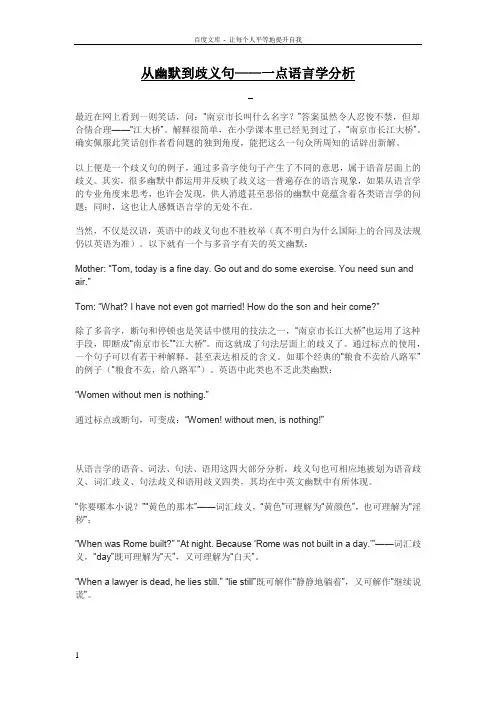
从幽默到歧义句——一点语言学分析最近在网上看到一则笑话,问:“南京市长叫什么名字?”答案虽然令人忍俊不禁,但却合情合理——“江大桥”。
解释很简单,在小学课本里已经见到过了,“南京市长江大桥”。
确实佩服此笑话创作者看问题的独到角度,能把这么一句众所周知的话辟出新解。
以上便是一个歧义句的例子,通过多音字使句子产生了不同的意思,属于语音层面上的歧义。
其实,很多幽默中都运用并反映了歧义这一普遍存在的语言现象,如果从语言学的专业角度来思考,也许会发现,供人消遣甚至恶俗的幽默中竟蕴含着各类语言学的问题;同时,这也让人感慨语言学的无处不在。
当然,不仅是汉语,英语中的歧义句也不胜枚举(真不明白为什么国际上的合同及法规仍以英语为准)。
以下就有一个与多音字有关的英文幽默:Mother: “Tom, today is a fine day. Go out and do some exercise. You need sun and air.”Tom: “What? I have not even got married! How do the son and heir come?”除了多音字,断句和停顿也是笑话中惯用的技法之一,“南京市长江大桥”也运用了这种手段,即断成“南京市长”“江大桥”。
而这就成了句法层面上的歧义了。
通过标点的使用,一个句子可以有若干种解释,甚至表达相反的含义。
如那个经典的“粮食不卖给八路军”的例子(“粮食不卖,给八路军”)。
英语中此类也不乏此类幽默:“Women without men is nothing.”通过标点或断句,可变成:“Women! without men, is nothing!”从语言学的语音、词法、句法、语用这四大部分分析,歧义句也可相应地被划为语音歧义、词汇歧义、句法歧义和语用歧义四类,其均在中英文幽默中有所体现。
“你要哪本小说?”“黄色的那本”——词汇歧义,“黄色”可理解为“黄颜色”,也可理解为“淫秽”;“When was Rome built?” “At night. Because ‘Rome was not built in a day.’”——词汇歧义,“day”既可理解为“天”,又可理解为“白天”。
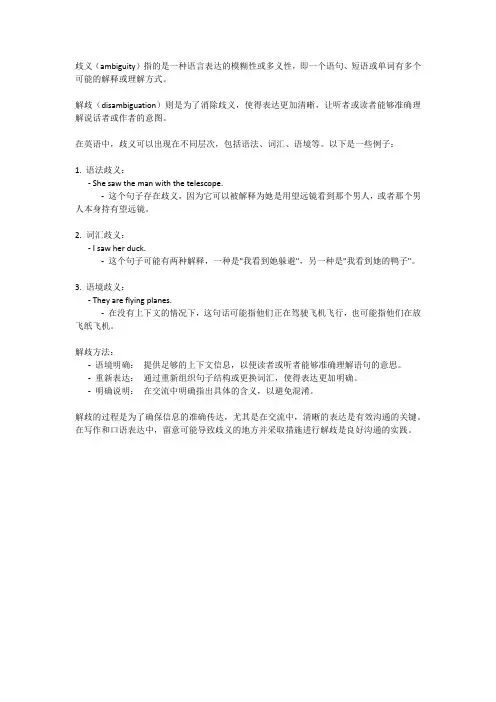
歧义(ambiguity)指的是一种语言表达的模糊性或多义性,即一个语句、短语或单词有多个可能的解释或理解方式。
解歧(disambiguation)则是为了消除歧义,使得表达更加清晰,让听者或读者能够准确理解说话者或作者的意图。
在英语中,歧义可以出现在不同层次,包括语法、词汇、语境等。
以下是一些例子:
1. 语法歧义:
- She saw the man with the telescope.
-这个句子存在歧义,因为它可以被解释为她是用望远镜看到那个男人,或者那个男人本身持有望远镜。
2. 词汇歧义:
- I saw her duck.
-这个句子可能有两种解释,一种是"我看到她躲避",另一种是"我看到她的鸭子"。
3. 语境歧义:
- They are flying planes.
-在没有上下文的情况下,这句话可能指他们正在驾驶飞机飞行,也可能指他们在放飞纸飞机。
解歧方法:
-语境明确:提供足够的上下文信息,以便读者或听者能够准确理解语句的意思。
-重新表达:通过重新组织句子结构或更换词汇,使得表达更加明确。
-明确说明:在交流中明确指出具体的含义,以避免混淆。
解歧的过程是为了确保信息的准确传达,尤其是在交流中,清晰的表达是有效沟通的关键。
在写作和口语表达中,留意可能导致歧义的地方并采取措施进行解歧是良好沟通的实践。

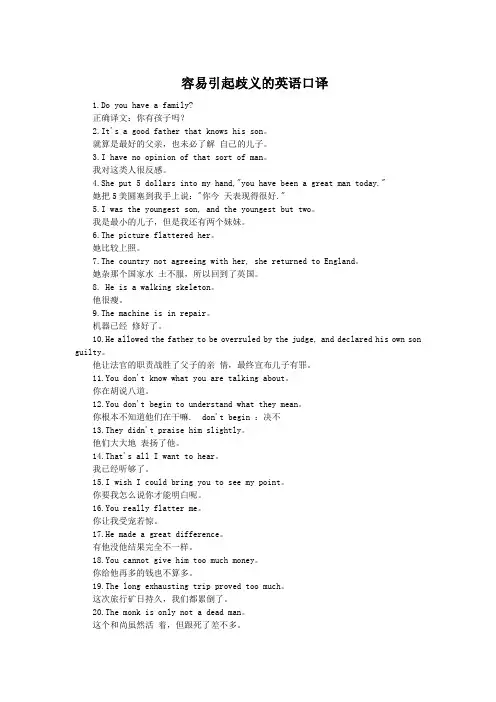
容易引起歧义的英语口译1.Do you have a family?正确译文:你有孩子吗?2.It's a good father that knows his son。
就算是最好的父亲,也未必了解自己的儿子。
3.I have no opinion of that sort of man。
我对这类人很反感。
4.She put 5 dollars into my hand,"you have been a great man today."她把5美圆塞到我手上说:"你今天表现得很好."5.I was the youngest son, and the youngest but two。
我是最小的儿子,但是我还有两个妹妹。
6.The picture flattered her。
她比较上照。
7.The country not agreeing with her, she returned to England。
她杂那个国家水土不服,所以回到了英国。
8. He is a walking skeleton。
他很瘦。
9.The machine is in repair。
机器已经修好了。
10.He allowed the father to be overruled by the judge, and declared his own son guilty。
他让法官的职责战胜了父子的亲情,最终宣布儿子有罪。
11.You don't know what you are talking about。
你在胡说八道。
12.You don't begin to understand what they mean。
你根本不知道他们在干嘛. don't begin :决不13.They didn't praise him slightly。
他们大大地表扬了他。

英语中产生歧义的翻译以及地道的口语翻译sporti ng house妓院(不是“体育室”)dead presid ent 美钞(上印有总统头像)(并非“死了的总统”)lover情人(不是“爱人”)busboy餐馆勤杂工(不是“公汽售票员”)busybo dy 爱管闲事的人(不是“大忙人”)dry goods(美)纺织品;(英)谷物(不是“干货”)heartm an 换心人(不是“有心人”)mad doctor精神病科医生(不是“发疯的医生”)eleven th hour 最后时刻(不是“十一点”)blinddate (由第三者安排的)男女初次会面(并非“盲目约会”或“瞎约会”)person al remark人身攻击(不是“个人评论”)sweetwater淡水(不是“糖水”或“甜水”)confid enceman 骗子(不是“信得过的人”)crimin al lawyer刑事律师(不是“犯罪的律师”)servic e statio n 加油站(不是“服务站”)rest room 厕所(不是“休息室”)dressi ng room 化妆室(不是“试衣室”或“更衣室”)horsesense常识(不是“马的感觉”)capita l idea 好主意(不是“资本主义思想”)famili ar talk 庸俗的交谈(不是“熟悉的谈话”)blacktea 红茶(不是“黑茶”)blackart 妖术(不是“黑色艺术”)blackstrang er 完全陌生的人(不是“陌生的黑人”)whitecoal (作动力来源用的)水(不是“白煤”)whiteman 忠实可靠的人(不是“皮肤白的人”)yellow book 黄皮书(法国政府报告书,以黄纸为封)(不是“黄色书籍”)red tape 官僚习气(不是“红色带子”)greenhand 新手(不是“绿手”)blue stocki ng 女学者、女才子(不是“蓝色长统袜”)Chinapolicy对华政策(不是“中国政策”)Chines e dragon麒麟(不是“中国龙”)Americ an beauty一种玫瑰,名为“美国丽人”(不是“美国美女”)Englis h diseas e 软骨病(不是“英国病”)Indian summer愉快宁静的晚年(不是“印度的夏日”)Greekgift 害人的礼品(不是“希腊礼物”)Spanis h athlet e 吹牛的人(不是“西班牙运动员”)French chalk滑石粉(不是“法国粉笔”)2.习语类pull one's leg 开玩笑(不是“拉后腿”)in one's birthd ay suit 赤身裸体(不是“穿着生日礼服”)eat one's words收回前言(不是“食言”)an appleof love 西红柿(不是“爱情之果”)handwr iting on the wall 不祥之兆(不是“大字报”)bringdown the house博得全场喝彩(不是“推倒房子”)have a fit 勃然大怒(不是“试穿”)make one's hair standon end 令人毛骨悚然—恐惧(不是“令人发指——气愤”)be takenin 受骗,上当(不是“被接纳”)thinka greatdeal of onesel f 高看或看重自己(不是“为自己想得很多”)pull up one's socks鼓起勇气(不是“提上袜子”)have the heartto do (用于否定句)忍心做……不是“有心做”或“有意做”)3.短句类What a shame!多可惜!真遗憾!(不是“多可耻”)You don't say! 是吗!(不是“你别说”)You can say that again!说得好!(不是“你可以再说一遍”)I haven't sleptbetter. 我睡得好极了。
容易产生歧义的双语对照句型本页仅作为文档页封面,使用时可以删除This document is for reference only-rar21year.March趣看中国人最易误解的45句话1. The house is really A-1.(误译)那间房子的门牌确实是A-1号。
(正译)那间房子确实是一流的。
bought a baker’s dozen of biscuits.(误译)他买了面包师做的12块饼干。
(正译)他买了13块饼干。
bull of Bashan woke the sleeping child with his noise.(误译)贝兴的一头公牛弄醒了那个酣睡的孩子。
(正译)一个大嗓门的人把那个酣睡的孩子吵醒了。
was a cat in the pan.(误译)他是盘子中的一只猫。
(正译)他是个叛徒。
cat may look at a king.(误译)一只猫都可以看到国王。
(正译)小人物也该有同等权利。
a hair of dog didn’t make him feel better.(误译)即使一根狗毛也不会使他觉得好些。
(正译)即使是再喝解宿醉的一杯酒,也不会使他觉得好些。
he a Jonah(误译)他就是叫约拿吗(正译)他是带来厄运的人吗is fond of a leap in the dark.(误译)吉姆喜欢在黑暗处跳跃。
(正译)吉姆喜欢冒险行事。
little bird told me the news.(误译)一只小鸟将此消息告诉我。
(正译)消息灵通的人士将此消息告诉我。
is a man of a woman.(误译)安吉拉是个有妇之夫。
(正译)安吉拉是个像男人的女人。
is a man of his word.(误译)内莉是他所说的那个人。
(正译)内莉是个守信用的人。
paid a matter of 1000 yuan.(误译)他付了1000元的货物账。
容易产生歧义的英语句子1. "I saw her duck."这句话可能产生歧义,因为它有两个可能的含义,一是“我看到了她躲避”,二是“我看到了她的鸭子”。
1. I saw her duck and it was so cute. (我看到了她的鸭子,很可爱。
)2. I saw her duck and she quickly moved out of the way. (我看到她躲开了。
)3. The hunter saw the duck fly away. (猎人看到鸭子飞走了。
)4. The waitress saw the duck in the pond. (女服务员看到了池塘里的鸭子。
)5. I saw her duck and realized it was a decoy. (我看到了她的鸭子,发现它是一个诱饵。
)6. He saw the duck-headed cane and thought it was a real duck. (他看到鸭头手杖,以为是真的鸭子。
)7. She saw the duck-shaped cloud in the sky. (她看到了天空中鸭子形状的云。
)8. The chef saw the duck on the menu and immediately started to prepare it. (厨师看到菜单上的鸭子,立刻开始准备。
)2. "I'm sorry. I love you."这句话也有两种可能的含义,一是“我很抱歉”,二是“我爱你”。
1. I'm sorry, I love you. (我很抱歉,我爱你。
)2. I can say I'm sorry, but I can never say I love you enough. (我可以说我很抱歉,但我永远无法表达出我对你的爱。
英语史上有最多歧义的句子
英语虽是当今的世界语,但依然充斥着歧义句,含糊不清,往往一句两解,不太明确。
英国近代两位文法大师Jocobs与Rosendbaum合著的English Transformational Grammar为我们提供了“一句六解”的例句,可说是当代歧义句子之中的最高纪录。
请大家细读这句有史以来最多解法的话:
The Seniors were told to stop demonstrating on campus.
暂时不要往下看,动一动脑筋,看看能列出多少个解法。
自我挑战,学思并重,也是提高中英语文水平的诀窍!
语文巨擘Jocobs与Rosenbaum说:非英语国家的学生能揣摩出三解就已很棒了!你试一试,可能也会觉得趣味盎然。
这个句子的第1解:
(1)The seniors were demonstrating and were asked, on campus, to desist.
(高年级的学生在示威,校方在校园要求他们停止示威。
)
第2个解法:
(2)The seniors were demonstrating and were asked to desist on campus (although they could demonstrate elsewhere).
(高年级学生在示威,校方要求他们停止在校园中示威但可在其他地方示威)。
第3个解法是:
The seniors were demonstrating on campus and were asked to desist.
(高年级的学生在校园示威,校方叫他们停止示威。
)
第4个解法是:
People were demonstrating on campus, and seniors were asked to stop them.
(有人在校园中示威,高年级生被要求去制止他们。
)
第5个解法:
People were demonstrating and seniors were asked, on campus, to stop them .
(有人在示威,高年级生在校园中被要求去制止他们。
)
第6个解法:
People were demonstrating and seniors were asked, to stop them from doing so on campus (although they could do it elsewhere)
(有人在示威,高年级生被要求去制止他们在校园中示威(但他们可在别处示威。
)。